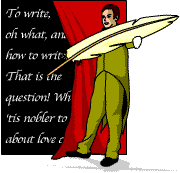Writing Right with Dmitri: Reading and Writing about Science
Created | Updated Jul 15, 2012
Words, words, words. That's what we're made of. Herewith some of my thoughts on what we're doing with them.
Writing Right with Dmitri: Reading (and Writing) about the Sciences

The comments that follow these columns, and the ensuing discussions, can be really interesting. I know I learn a lot from them. One idea can lead to another, and I for one am grateful for all the feedback. Take the other week, when I had the temerity to indulge in unseemly levity on the subject of Erasmus and Charles Darwin. (I blame the heat in my neck of the woods.)
Actually, I expected somebody to complain that I'd dissed Erasmus' poetry, but nobody did. I guess sexy flower verse is out of fashion. Instead, Phoenician Trader took me to task for criticising Charles' prose style. In my defence, I replied that, according to The Times Literary Supplement, George Eliot, Karl Marx, and Friedrich Engels weren't in love with Darwin's prose, either. PT replied with a stirring encomium to the pioneer biologist:
I think Darwin's prose style needs to be compared to the millions of pages of natural history from the 19th Century. Comparing scientific writing to George Eliot fictional efforts is a bit hard since the audiences were so different – not least a lot of scientific readers were actually going out and physically following-up what they had read. Also Eliot could alter her plotlines in a way Darwin would have struggled to do with palaeontology. – Phoenician Trader
PT followed up this thought by contacting Cambridge University's Dr Alison Wood, who had this to say on the subject of Darwin and writing:
Darwin can write like an angel, albeit a hardworking, careful, agonised angel. Without his complex, elegant metaphors, for example, we would understand far less about the complex, elegant (and brutal) systems he wants us to understand. And D knows just how to deploy that metaphor (Gillian Beer's 'Darwin's Plots' (1993) is wonderfully good on this). It was also Beer who helped people to see the narrative structures at work in D's prose. It is D who borrows from the novelists toolkit – tension, relief, an uncertain arc, a strong and yet sympathy evoking narrative voice. There is wonder and immensity and sheer, splendid massiveness – and plenty of almost loving description. – A Dr Alison Wood, quoted by permission.
All right, I apologise for falling asleep on Darwin. This was obviously a character defect on my part. But it got me to thinking about scientists who wrote/write engagingly, whose work I found harder to put down than I did Charles Darwin's. I thought I might compose a little reading list for your delectation and further discussion. I know, I know – I'll get more grief from Cambridge and you. But at least it's a talking point. Feel free to take pot-shots at my list.
Science Reading for Fun
Here's my shortlist. Not all are biology. Not all are even what some of you purists regard as hard science – I'm definitely throwing in some anthropology, for example.
- Rats, Lice and History, by Hans Zinsser (1935). The 'biography' of typhus. Engaging, literary, and very, very funny in places.
- Cows, Pigs, Wars, and Witches: The Riddles of Culture, by Marvin Harris (1975). Wonderful theories about why people do what they do. The book takes you on a fabulous journey through history and the human mind. In addition to taking you on an adventure, Harris treats you to an anti-Castaneda rant that is worth the price of admission. (Castaneda is brilliant, but if you're reading this list, you probably want science, not mysticism.)
- The Dancing Wu Li Masters, by Gary Zukav (1979). The author relates something confusing – i.e., physics – to something I can understand, which is Hindu mythology. Thank you.
- The Holographic Universe, by Michael Talbot (1991). Another wonderful romp through the world of quantum physics, space/time, and the question that so bothered Philip K Dick: 'What is reality?'
- Behind the Mirror: A Search for a Natural History of Human Knowledge, by Konrad Lorenz (1973). In German, it's called Die Rückseite des Spiegels, but you can't call it The Backside of the Mirror in English, now, can you? Actually, read anything by Konrad Lorenz. I defy you not to be delighted and enlightened. I also defy you not to fall over laughing at times. Just try Lorenz's autobiographical sketch, written for the Nobel Committee. See what I mean?
- The Man Who Mistook His Wife for a Hat, by Oliver Sacks. The author, a neurologist and psychologist, recounts case studies of unusual clinical conditions, such as the problem of the man in the title. More exciting than the newspaper, and you really learn more about the mind.
- Anything, but anything, by Gerald Durrell. Durrell was a world treasure because of his conservation work. His writing is remarkable, not only for its information, but for its sense of sheer joy. If you're ready to shed a tear, read Durrell's time capsule message for the Jersey Zoo.
This is only a starter list. I'm sure I could think of others. I'm sure you can, too. Send us a comment. What books on scientific subjects have aroused your admiration for their ability to teach, engage, explain?
If you only read extremely dry papers by eminent, admired figures, please do not tell us about it. (Yawn.) We'll take your word for it.
Writing Right with Dmitri Archive
